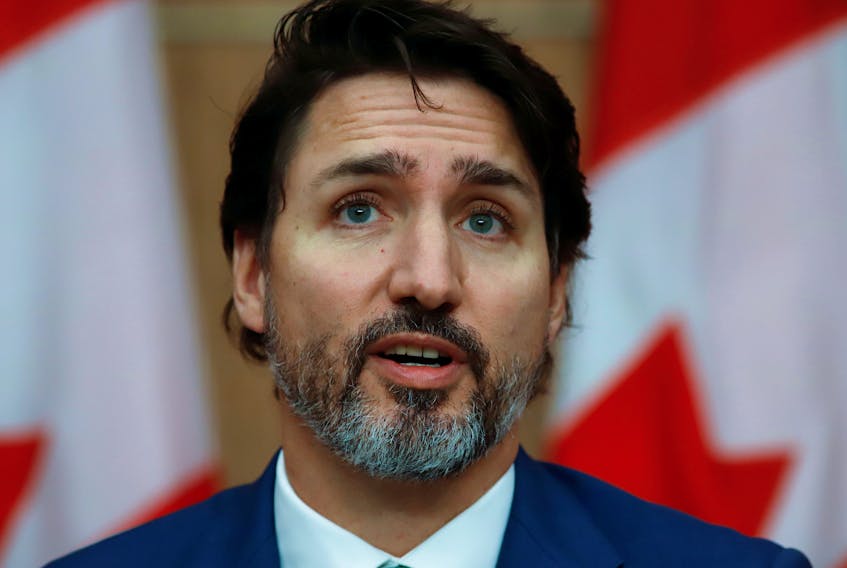NEW MINAS, N.S. — Justin Trudeau wants all Canadians connected to high-speed internet by 2030.
It’s a lofty goal, but one the Canadian Prime Minister is “extremely confident” will be reached.
The federal Liberals this week announced $1.75 billion in federal funding to support high-speed internet connectivity across the country.
The goal is to connect 98 per cent of Canadians by 2026, and all Canadians by 2030.
In an interview Tuesday, Nov. 10, with the SaltWire Network, Trudeau said the federal government has long realized the importance of getting everyone online.
“Doing this was always part of our plan, we’re just doing it a lot faster with a lot more money now,” Trudeau said.
Data is becoming a basic utility in the home, it’s no longer a luxury, and that’s why the government has made $6.2 billion available for universal broadband since 2015.
Trudeau noted the Liberal government has invested 10 times more in the past five years than the previous government invested in a decade.
“The challenge with it is it’s not something that government suddenly flips a switch and does, regardless of the money we put into it,” Trudeau said.
The Nov. 9 announcement adds $750 million to the $1 billion previously announced as part of the 2019 budget for the Universal Broadband Fund. It exists to connect households and businesses in underserviced communities over the next six years.
Included is a $150 million rapid response stream with an accelerated application process.
The prime minister said this will allow shovel-ready projects that could be completed by next November to get started right away.
Now more than ever, Canadians need reliable access to high-speed Internet. Today’s announcement will help to bring faster Internet access to every part of our country, grow businesses, and create new jobs ⬇️ https://t.co/p16Te8PZHg pic.twitter.com/iGupsc1JQA
— CanadianPM (@CanadianPM) November 9, 2020
More than a pandemic response
Trudeau stated if there are more projects than money, the government will find more funding because “getting people connected right now is an absolute priority because of COVID and because of what COVID has shown us” in terms of the importance of broadband.
However, he doesn’t view the funding as only being a federal response to COVID-19, noting Ottawa had recognized the importance of broadband and made historic investments pre-pandemic.
What COVID-19 has done, he said, is illustrate the importance of moving at a higher speed and doing more, carrying out what would have been done in the coming years over months instead.
“We know that being there for Canadians, including with broadband access, is what we need to get through this and to come roaring back stronger on the other side,” Trudeau said.
Partnerships needed
The prime minister said partnerships have to be forged to bring broadband projects to fruition, noting the Connect to Innovate program invested over $122 million and has connected nearly 150,000 households across Atlantic Canada.
In terms of the response of private industry in Atlantic Canada to the demand for expanded high-speed internet service, Trudeau said the vast majority of companies have been willing to form partnerships.
He said the government recognizes that extending infrastructure to a small community or remote handful of homes isn’t necessarily cost-effective for companies.
The government, Trudeau said, has stepped up to make it worth their while.
“Once those connections are there, as we’ve seen, more people can choose to live where they actually want to live,” Trudeau said.
He added it’s important for all Canadians to have the ability to take part in the economy, regardless of where they are.
Many municipal governments across Atlantic Canada have tapped into federal and provincial funding streams to expand high-speed internet service, such as the Connecting Kings – Connect to Innovate project currently being executed by the County of Kings in Nova Scotia in partnership with iValley.
Kings County Mayor Peter Muttart said that federal support is integral to their municipal broadband project.
"We, as a municipality, would not be rolling out broadband at all were it not for our federal partners joining us through that CTI program to give us a leg up on our funding, so it was very important," he said.
Muttart said they take some heart in the renewed announcement of the federal government that there will be funding they can apply for that would give them the opportunity to expand the project to reach those that no one would ever find a business case to connect.
An Atlantic advantage
Trudeau said one advantage Atlantic Canada has compared to other regions is that it has been settled for a very long time and the population is well-distributed throughout.
Although there are challenges in connecting areas that are more remote, particularly in Newfoundland and Labrador, most of Atlantic Canada is nowhere near as remote and challenging to service as other parts of the country.
This means most connections will be hard-wired with fibre optic cable, as opposed to wireless connections, and it’s just a question of working with local telecom providers and making some investments.
The prime minister has also announced a $600 million agreement with Canadian satellite company Telesat to improve high-speed internet connectivity and expand coverage in the far north, rural and remote areas through low-orbit satellite capacity.









